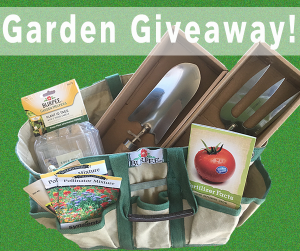We’ll Give You Tools to Celebrate National Gardening Month!
Spring has officially arrived and National Garden Month is underway. To celebrate the new season, Latham Hi-Tech Seeds will give away a gift pack of gardening tools!
It’s time to get those early crops in the ground and finalize plans for the rest of the garden. I’ve seen Facebook posts from my friends, who have spent the past few weeks putting seeds in containers and starting them in greenhouses. Last weekend some friends were planting potatoes.
I usually plant potatoes and tomatoes, as well as pick strawberries. But I have to admit, my garden produce is ripe during one of the busiest times of the year in my business. I spend two weeks every June traveling out of state to attend business meetings. Our annual Latham® dealer meeting is held the beginning of July, and our county fair is always in the middle of July.
On top of that, I spend nights and weekends attending numerous horse shows across North Iowa with my daughter. Nearly every weekend my son plays in a basketball tournament somewhere in the Midwest, plus he plays on our school’s baseball team. I meet myself coming and going! As a result, my produce is usually ripe when I’m not home and weeds take over my garden by the summer’s end.
This spring I decided to give myself a little grace. Rather than stressing about not having a space worthy of a Better Homes & Gardens photo spread, I’m going to plant pollinator packets instead of vegetable seeds. I can #FeedaBee, enjoy blooms all summer long, and stop feeling guilty that I’m not out weeding my garden every time I have 15 minutes in between work and kids’ activities.
Sound good? Perhaps this blog can help inspire you the way a visit to Cynthia and Ritch Berkland’s beautiful Iowa century farm got me excited about pollinator gardens. Their gardens were stunning! Since I first planted a butterfly garden about 12 years ago in my backyard, I was interested in learning more. Two tips from Cynthia are:
- Use native plants from your ecoregion as they will be the hardiest. Plants native to your region also will take the least effort and be the most attractive to pollinators.
- Cultivars are all clones and lack the biodiversity that increases the chances of their survival. They may not have as many stunning colors or exotic flowers, but the increase in fauna of all kinds should make up for that.
Cynthia then introduced me to the gardening book in the giveaway bag to provide more information about native plants. I gave a copy of it last year to my mom for Mother’s Day. In addition, my visit last summer to the Berkland Century Farm also motivated me to post a series of related blog posts:
- Follow These 3 Ps for a Pollinator-Friendly Garden
- Add Backyard Beauty with a Butterfly Garden
- Gardening Can Be for the Birds
In a Letter to the Editor last summer, Cynthia wrote:
If you watch the action on your lawn, you’ll see the only place a pollinator stops to visit is the occasional dandelion or clover. Just think of the difference we could make if each of us stopped mowing and planted native grasses and wild flowers in just one corner of our yard! Native grasses and wild flowers take almost no maintenance, and once they’re established, they provide food and habitat for the native fauna of the prairie.
Another way we can all make a difference is to stop mowing the road ditches. Bees, butterflies, dragonflies and other insects – not to mention pheasants, partridge and other animals – can’t use neatly manicured ditches. They need the flowers and grasses that used to grow wild when Iowa was covered with thousands of acres of prairie.
Please consider doing what you can to change the situation. Do something meaningful and help provide pollinator habitat!
